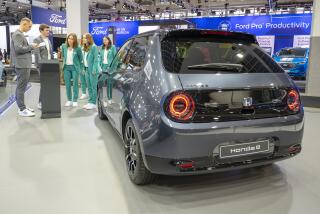Tokyo turns the clock to near future
CHIBA, Japan — The usually futuristic “concept cars” at the Tokyo auto show seem more realistic this year amid soaring oil prices, with ecologically friendly autos grabbing the limelight.
The overriding message at the Tokyo Motor Show, which opened Saturday, is that gas-guzzlers must make way for green cars that pollute less and rely less on fossil fuels.
The show’s experimental cars include a vehicle that switches between an electric motor and a hydrogen-powered engine, from Mazda Motor Corp., and a fuel-cell small car from Suzuki Motor Corp.
Toyota Motor Corp., the first automaker to sell a commercially mass-produced hybrid with its Prius in 1997, is showing an even more advanced hybrid, Fine-X, powered by an electric battery and a pollution-free hydrogen fuel cell. The hydrogen, stored in a fuel tank, combines with oxygen in the air to form water clean enough to drink.
GM also is pushing its technological prowess, displaying its collaboration in fuel cells with Japanese partner Suzuki that adapted GM’s technology for the small car, Suzuki’s specialty.The driver’s seat in Suzuki’s Ionis can be shifted from side to side or to the center to allow for more room when driving alone.
Also drawing attention was Mazda’s Senku concept car, which features a direct-injection gasoline rotary engine with a hybrid electric unit.
“We don’t know where the markets are going,” said Carlos Ghosn, of Nissan Motor Co. “We have to observe what’s going down, see the trends, look at every vibration on the market, ... and jump when consumers start to think one way or the other.”






